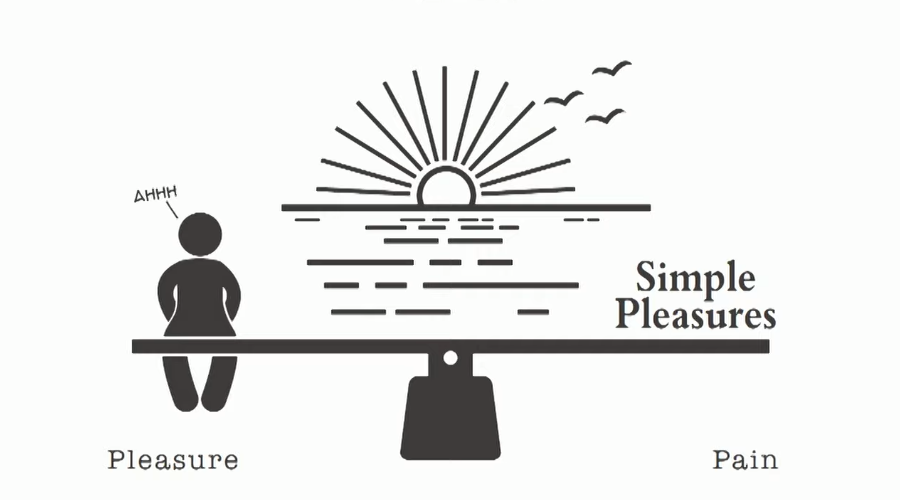Level Up Your Gaming Happiness
Using neurochemistry to understand how you can make gaming better

There is an imaginary balance somewhere in your brain. The word "pleasure" is printed on one side and "pain" on the other. If you have the patience to read this article, it's presumably in equilibrium. But if you're already craving a cat video or fighting the urge to take a quick look at your socials...it might not be.
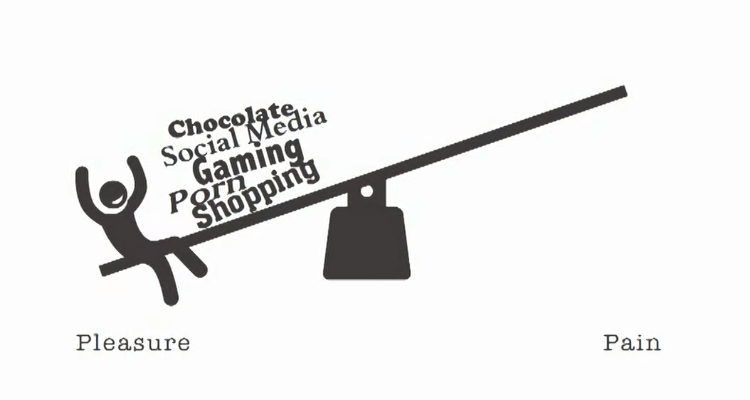
So first, let's understand what dopamine and serotonin are and how they interact, as they're both vital to this discussion.
Neurochemistry 101: Pleasure vs. Pain
Dopamine is a vital messenger (neurotransmitter) in our brain. It excites us to pursue goals, be they in-game or in real life. According to endocrinology professor Robert Lustig, author of The Hacking of the American Mind, dopamine is the chemical that says, 'This feels good. I want more.' Serotonin, on the other hand, is the inhibitory neurotransmitter that says, 'This feels good. I don't want or need any more.' Lustig states: "Pleasure is dopamine, and happiness is serotonin."
A problem arises when you pursue too much pleasure, which is easy to obtain nowadays – take, for example, our ability to easily and excessively play video games. Lustig states, "There's one thing that downregulates serotonin: dopamine. The more pleasure you seek, the more unhappy you get." Stanford professor of psychiatry Anna Lembke, author of the book Dopamine Nation, also concludes: "We're all so miserable because we're working so hard to avoid being miserable."
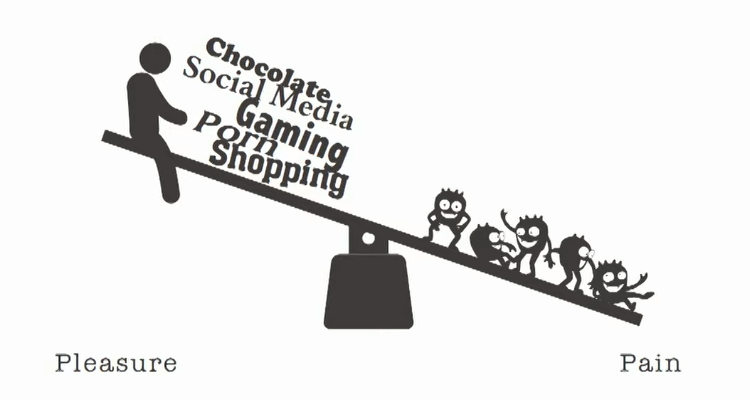
The Plenty Paradox
Lembke's explanation lies in what she coined the 'plenty paradox.' We evolved for scarcity. An abundance of pleasurable options is relatively new to human history.
Her enlightening lecture on YouTube gave me crucial context to my previous article on backlog anxiety: "Overabundance is itself a stressor, caused by the mismatch between our primitive wiring and our modern dopamine-rich ecosystem."
Paradoxically, the more stressed you are - an emotion regulated by cortisol - the more instant gratification (dopamine) you seek. The more instant gratification you seek, the more unhappy you get, which in and of itself can lead to more stress. Lembke argues that – mainly because of our smartphones but also video games – almost all of us are in a state of chronic dopamine deficit.
Opponent Process Mechanism
Now, back to the pleasure/pain balance: it is a metaphor from Lembke and works according to the 'opponent process mechanism.' In other words, like a seesaw.
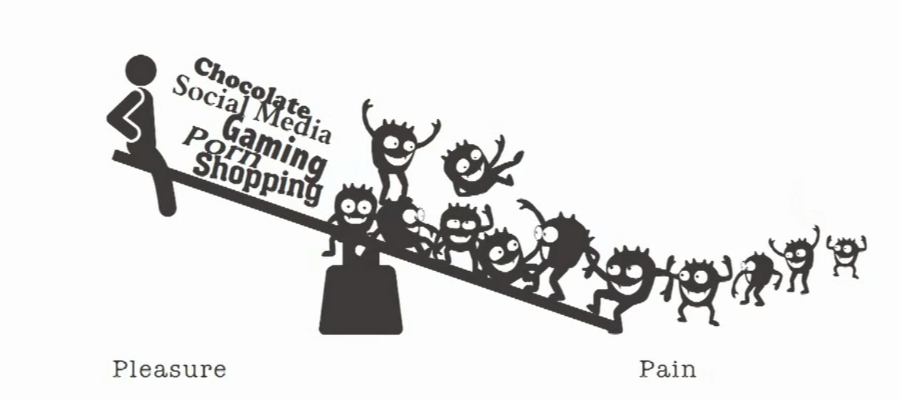
According to Lembke: "If we engage in a behavior that causes a very large dopamine release in the brain's reward pathway, our brains will immediately respond to that by downregulating our dopamine production and transmission. They will put us into a dopamine deficit state. It's not that we go back to a level balance or homeostasis; we go below baseline dopamine levels."
Have you ever felt empty after an intense play session? Well, there you go.
Visualize this dopamine deficit as a group of benevolent "gremlins" on the pain side of the balance, pushing you to seek relief in the form of pleasure. If we have patience, our dopamine levels will be restored automatically. As Lembke puts it, "If we wait long enough, those gremlins hop off, and homeostasis is restored."
If you seek pleasure too often, tolerance can set in, making you need more of the same stimulus (games, snacks, cigarettes, porn, drugs, etc.) to get the same reward. If this happens, getting out of the dopamine dip takes longer, and cravings intensify. This is when addiction and depression can occur.
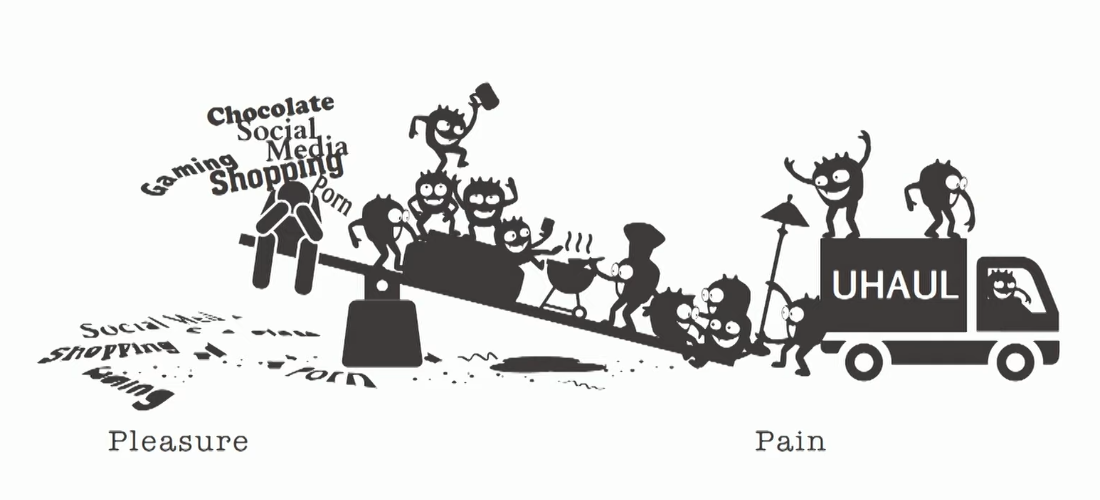
"When you repeatedly engage in something that you enjoy, your threshold for enjoyment goes up, and up, and up," says Lemke's colleague Andrew Huberman, popular podcaster and professor in neurobiology. "People will play a video game, and they love it. It is super exciting to them. And then they will keep playing, and playing, and playing."
It's like that feeling of one more run while playing Slay the Spire. The random card rewards only add to the addictive nature of this type of game. And then I did not even mention loot boxes and gacha games yet, which provide you tasty hints of dopamine with every microtransaction.
If we seek too much stimulation, we not only create a cycle of spikes and crashes, but we also increase our baseline level. The result: we need more of the same (e.g. game) to experience the same reward, constantly seeking relief from pain (the dopamine deficit state).
So...what is the solution to maintaining a healthy balance?
Abstain, Maintain, and Seek Out Pain
Lembke offers a solution: abstain, maintain, and seek out pain, which is fairly self-explanatory. You should avoid what you are addicted to, use what gives you pleasure in moderation, and train yourself on delayed gratification.
This can be quite a challenge. A one-off detox is more manageable than changing your lifestyle. After all, this depends on willpower and perseverance, especially in the beginning. Lembke, therefore, recommends creating barriers, whether physical or mental, to maintain our new healthy habits:
- Geographical, for example: "I don't let any console or phone into the bedroom."
- Chronological, for example: "I have to exercise before I start gaming."
- Categorical, for example: "I don't play video games with microtransactions (e.g. Diablo IV, Pokémon Go, or gacha games)."
- Chemical – I recommend seeking professional medical advice for this one.
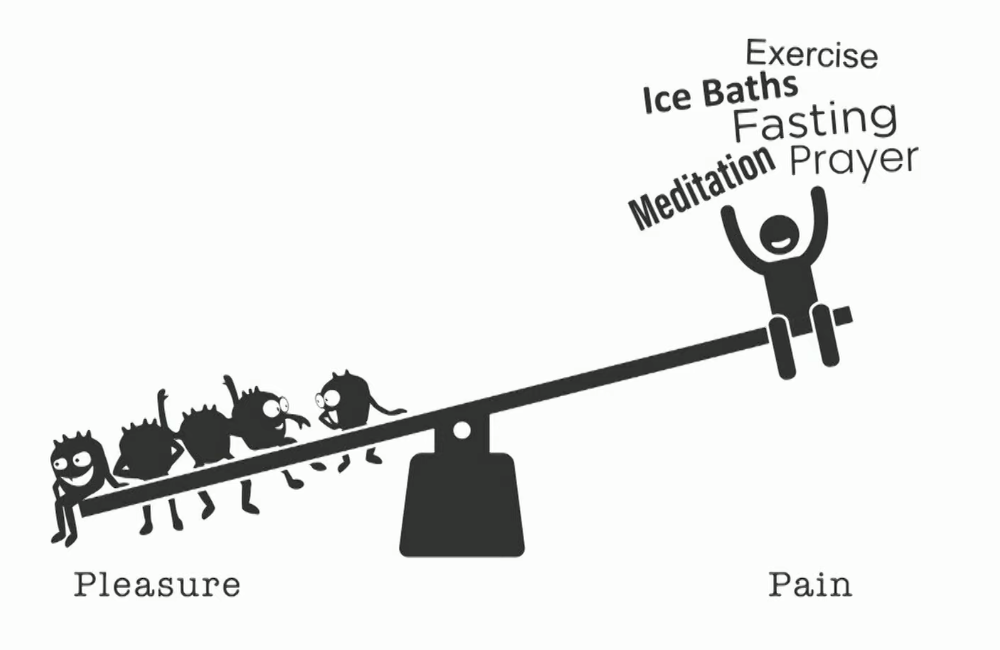
The principle behind seeking out pain is that if you intentionally take up challenges and fill the pain side of your balance voluntarily, you prevent the gremlins from having to do it. Moreover, they will move over to the pleasure side of the balance. Lembke says, "Those gremlins are agnostic to whatever the initial stimulus was."
Another benefit is that it is not followed by a dip below the baseline (deficit state). She gives examples of exercising or taking cold showers. "This is a healthy way to get our dopamine indirectly by paying for it upfront." An example of this pain/pleasure balance is my research and writing for this article during my holiday. I could have easily spent these hours finishing Tears of the Kingdom, but that wouldn't have given me the same satisfaction.
This article, like many, took shape after a painful start. The pursuit became joyful, and I regularly entered a flow state (surprise: these are also regulated by dopamine). I finished TotK later but with a more prominent feeling of reward.
Self-control and the ability to seek challenges are the paradoxical keys to happiness in times of abundance. Huberman states: "Don't spike dopamine before engaging in effort, and don't spike dopamine after engaging in effort. Learn to spike dopamine from effort itself."
Breaking the cycle and lowering your baseline requires moderation, like a gaming detox (temporary abstinence) or permanent habit changes. Gamers often boast about their extensive playing hours, occasionally prioritizing gaming over their social lives. But in understanding your limits and how dopamine works in this equation, people can further research and work towards their balance of gaming and real life along with other pursuits.
Enjoy the Process, Not the Reward
I recently saw a billboard from a wine shop: drink less, drink better. Playing video games too much can be harmful, as can drinking too much wine. But to be clear, that does not mean they're inherently wrong. Video games can be a fantastic way to achieve pleasure and happiness. I'm quite certain that playing Tears of the Kingdom made me happy, just like my current experience of progressing through Sonic Mania and Chrono Trigger.
So, for anyone to whom this article strikes a chord, I offer this parting adage: play less, play better.
